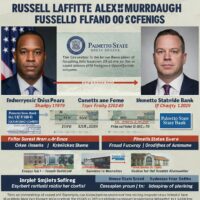Colleyville Businessman Sentenced to 84 Months in Federal Prison For Role in a Ponzi Oil and Gas Fraud Scheme
FORT WORTH, Texas — James VanBlaricum, 78, of Colleyville, Texas, was sentenced today before Senior U.S. District Judge Terry R. Means to 84 months in federal prison and ordered to pay $32,222,291 in restitution for participating in a Ponzi oil and gas fraud scheme, announced U.S. Attorney John Parker of the Northern District of Texas.
VanBlaricum, who operated Signal Oil and Gas Company (SOG) and Texas Energy Management, which later became Texas Energy Mutual (TEM), pleaded guilty in February 2017 to one count of mail fraud. He has been in custody since his arrest in mid-August 2016.
According to plea documents, VanBlaricum formed SOG and TEM, ostensibly for the purpose of investing in mineral leases, and oil and gas production and earning a profit from those investments. VanBlaricum ran the fraud scheme from approximately January 2007 to August 2016, from office locations in Grapevine, Texas and Bedford, Texas, as well as from his residence and home office located in Colleyville, Texas, where many of the acts and transactions alleged in the indictment took place. VanBlaricum raised millions of dollars from investors by various means, including selling securities in the form of joint ventures in “programs” offered by SOG and TEM.
VanBlaricum employed sales agents who worked on his behalf to raise money, by selling limited partnership interests in these “programs” offered by SOG and TEM. Both personally and through investors, VanBlaricum deceived investors and potential investors by representing that investors would earn an “assured” rate of return on their initial investment, and they would receive a full refund of their initial investment amount after a defined period of time. He also represented that he intended to use a certain percentage of investors’ money to purchase mineral leases, and oil and gas well projects, when in fact, he intended to spend a substantially smaller percentage on the leases and oil and gas well projects and use a substantial part of investors’ money for purposes they did not authorize or even know about, including paying purported investment returns to other investors, commissions to sales agents, and paying his personal expenses as well as personal expenses for family members, friends, and business associates.
VanBlaricum also represented that he had purchased certain assets, or was in the process of purchasing them, when in fact, he had not purchased the assets and was not in the process of purchasing them. He also represented that the oil and gas well projects were productive and profitable, when in fact, most were “dry holes,” produced oil for a short period of time, or had not been drilled.
When VanBlaricum made promises about the use of investor funds, he failed to state that he had made the same promises to other investors and then used those investors’ funds for purposes they did not authorize or even know about, including paying purported investment returns to other investors, commissions to sales agents, and payment of personal expenses for VanBlaricum and his family, friends, and business associates.
VanBlaricum, according to plea documents, identified himself to investors using a false name. VanBlaricum deposited investors’ funds into, and withdrew and expended investors’ funds, from accounts he controlled in the names of entities he controlled. He caused funds to be transferred to, withdrawn from, and deposited into various accounts to create the appearance of business operations and revenue that he knew did not exist. He also caused “lulling” payments to be paid to investors, ostensibly as returns on investment, when he knew the funds came from other investors rather than from business operations.
VanBlaricum secretly, and without authorization, took and spent money entrusted to him by investors for advertising; vacations and international travel; rent payments; automobile purchases; and payroll and commissions for employees and sales agents.
The U.S. Postal Inspection Service with assistance from U.S. Immigration and Customs Enforcement (ICE) Homeland Security Investigations (HSI) investigated, and additional assistance was provided by the Securities and Exchange Commission. Assistant U.S. Attorney Douglas A. Allen prosecuted.














